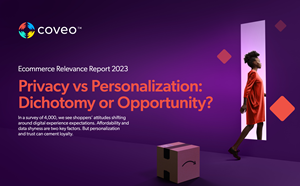Ecommerce Shopper Dichotomy: Coveo Study Unveils Balancing Act Between Privacy and Personalization in an Uncertain Economy
Coveo survey shows that 93% of 4,000 consumers expect the online shopping experience to be better than in-store yet 91% encounter a range of problems that may impact trust and brand loyalty
MONTREAL and SAN FRANCISCO, May 10, 2023 (GLOBE NEWSWIRE) -- Coveo (TSX:CVO), a leader in AI platforms that transform digital experiences with intelligent search, recommendations, 1:1 personalization, and merchandising, today announced its third annual Ecommerce Relevance Report with insights based on a survey of 4,000 shoppers in the U.S. and U.K. The report reflects how the current economy and affordability of products is changing consumer behavior. It also shows that shoppers are wary of their privacy, but willing to share more data about themselves if it means they will get a better deal, or personalized offer.
The report also confirms that commerce sites continue to have problems that create discontent,impacting brand loyalty and trust.
"Shoppers expect their online experiences to be equal or better than in-store, yet many brands are not meeting these expectations," said Brian McGlynn, General Manager of Commerce Solutions, Coveo. "Consumers also prefer anonymity, which is a challenge for retailers who don't have the trust of their consumers. We found that there are economy-driven generational differences when it comes to brand loyalty and the shift towards private label products. But building trust is a key differentiator for building loyalty, and a great experience with your brand can still make a positive impact on that trust."
Some of the key trends observed in Coveo’s latest consumer survey data include:
- Shoppers prefer anonymity. With the demise of the third-party cookie, Coveo asked shoppers their views on giving personal information. Nearly half (48%) said that they have abandoned an online purchase when asked to create an account and 32% state they always checkout as a guest. More than half of respondents (57%) are also unaware of how much data they share when shopping online, a percentage that stays about the same across generations. But consumers don’t seem overly concerned about it when they get something in return — 52% said that they are willing to share data when shopping online if it means they get better deals and offers. In other words, retailers need to make it worth their while to share that data.
- Affordability is a factor in consumer shopping behavior: A majority of respondents (83%) said they are relying on more affordable stores or buying more private-store-label products, indicating that brand loyalty may be at risk. Baby Boomers are most likely to be loyal to brands and stores. Consumers in the U.K. are less brand loyal and even more likely to buy private products than their U.S. counterparts (42% and 37% respectively), while younger groups are more likely to shop at more affordable stores than older generations.
- Most consumers expect online shopping to be better than in-person shopping. As retailers try to satisfy online retail expectations, shoppers resoundingly say they often encounter problems in the digital world. Most respondents (93%) expect their online shopping experience to be better than/equal to what they receive while in-store. Most (91%) said they encounter problems online, with nearly a third citing poor site performance (33%) and lack of findability (32%) as the top issues, followed by missing product information (27%), disorganized navigation (26%), not being mobile friendly (25%), and too many irrelevant recommendations (24%). If we look at only the digitally native Gen Z, 96% report encountering problems. They are 46% more likely to be frustrated by lack of product discovery, nearly 13% more likely to be upset that they can’t discover new products, and 11% more aggravated that the site doesn’t allow filtering.
- Online shopping and in-person shopping are linked. Shoppers show a strong preference for researching products before purchasing, with 79% saying that they conduct research online and on social media. That includes research on a brand’s website, with 37% researching products online and purchasing in-store. However, 22% of shoppers complain that they don’t know if stock is available at their local store.
To download the full report, click here.
About Coveo Solutions
We believe that relevance is critical for businesses to win in the new digital experience economy and to serve people the way they expect while ensuring optimal business performance, and that applied AI is an imperative to achieve these goals.
Coveo Relevance Cloud™ is a market-leading AI Platform that optimizes relevance into digital experiences such as commerce, service, website, and workplace applications. Coveo injects search, recommendations, personalization, and merchandising AI models, including testing and analytics. Coveo’s AI platform is cloud-native SaaS, multi-tenant, API-first, and headless, and can easily integrate into almost any digital experience, with AI models designed to learn from every interaction to serve the next. Our solutions are designed to provide tangible financial value to our customers by helping to drive improvements in conversion, revenue, and margins, reduce customer support costs, increase customer satisfaction and website engagement, and improve employee proficiency and satisfaction.
Our AI platform powers digital experience relevance for many of the world’s most innovative brands, serving millions of people and billions of interactions, and is supported by a large network of global systems integrators and implementation partners. Coveo is a Salesforce ISV Partner, an SAP® Endorsed App, and an Adobe Accelerate Exchange Partner.
Coveo is a trademark of Coveo Solutions, Inc.
Stay up to date on the latest Coveo news and content by subscribing to the Coveo blog, and following Coveo on LinkedIn, Twitter, and YouTube.
Highwire PR
Coveo
media@coveo.com
+1 418-263-1111
Forward-Looking Information
This press release contains “forward-looking information” and “forward-looking statements” within the meaning of applicable securities laws (collectively, “forward-looking information”). This forward-looking information is identified by the use of terms and phrases such as “may”, “would”, “should”, ”could”, “might”, “will”, “achieve”, “occur”, “expect”, “intend”, “estimate”, “anticipate”, “plan”, “foresee”, “believe”, “continue”, “target”, “opportunity”, “strategy”, “scheduled”, “outlook”, “forecast”, “projection”, or “prospect”, the negative of these terms and similar terminology, including references to assumptions, although not all forward-looking information contains these terms and phrases. In addition, any statements that refer to expectations, intentions, projections, or other characterizations of future events or circumstances contain forward-looking information. Statements containing forward-looking information are not historical facts but instead represent management’s expectations, estimates, and projections regarding future events or circumstances.
Forward-looking information is necessarily based on a number of opinions, estimates, and assumptions that we considered appropriate and reasonable as of the date such statements are made. Although the forward-looking information contained herein is based upon what we believe are reasonable assumptions, actual results may vary from the forward-looking information contained herein. Certain assumptions made in preparing the forward-looking information contained in herein include, without limitation: our ability to capitalize on growth opportunities and implement our growth strategy; our ability to attract new customers, both domestically and internationally; the success of our efforts to expand our product portfolio and market reach; our ability to maintain successful strategic relationships with partners and other third parties; our future capital requirements; the available liquidity under our revolving credit facility; the accuracy of our estimates of market opportunity and growth forecasts; our success in identifying and evaluating, as well as financing and integrating, any acquisitions, partnerships, or joint ventures; our ability to execute on our expansion plans; and the future impact of the COVID-19 pandemic. Moreover, forward-looking information is subject to known and unknown risks, uncertainties, and other factors, many of which are beyond our control, that may cause the actual results, level of activity, performance, or achievements to be materially different from those expressed or implied by such forward-looking information, including but not limited to macro-economic uncertainties and the risk factors described under “Risk Factors” in the Company’s most recently filed Annual Information Form available under our profile on SEDAR at www.sedar.com. There can be no assurance that such forward-looking information will prove to be accurate, as actual results and future events could differ materially from those anticipated in such information. Accordingly, prospective investors should not place undue reliance on forward-looking information, which speaks only as of the date made.
Moreover, we operate in a very competitive and rapidly changing environment. Although we have attempted to identify important risk factors that could cause actual results to differ materially from those contained in forward-looking information, there may be other risk factors not presently known to us or that we presently believe are not material that could also cause actual results or future events to differ materially from those expressed in such forward-looking information.
You should not rely on this forward-looking information, as actual outcomes and results may differ materially from those contemplated by this forward-looking information as a result of such risks and uncertainties. Additional information will also be set forth in other public filings that we make available under our profile on SEDAR at www.sedar.com from time to time. The forward-looking information provided in this press release relates only to events or information as of the date hereof, and are expressly qualified in their entirety by this cautionary statement. Except as required by law, we do not assume any obligation to update or revise any forward-looking information, whether as a result of new information, future events, or otherwise, after the date on which the statements are made or to reflect the occurrence of unanticipated events.
A photo accompanying this announcement is available at https://www.globenewswire.com/NewsRoom/AttachmentNg/bf35915f-a1ac-4065-adf6-760521fe48cb

Released May 10, 2023


